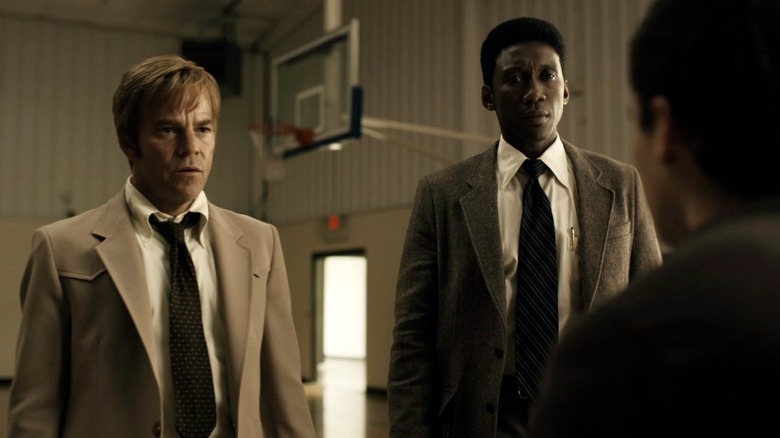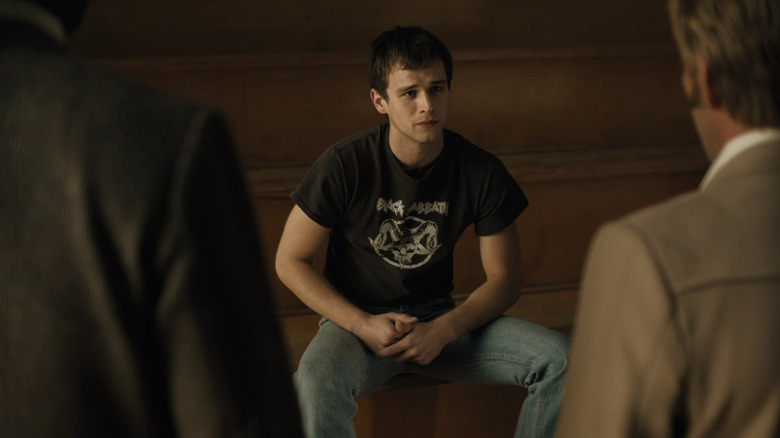Despite Parallels, True Detective Season 3 Is Not Based On The West Memphis Three
When "True Detective" season 3 premiered on HBO in 2019, viewers noticed right from the first episode that there were similarities between the central murder case and the real-life case of the West Memphis Three in Arkansas. This began with the murder setting: a fictional town called West Finger, Arkansas, where children go missing and three teenage boys are implicated, just as in the West Memphis Three case.
Films like Atom Egoyan's "Devil's Knot," the Peter Jackson-produced documentary "West of Memphis," and Joe Berlinger and Bruce Sinofsky's "Paradise Lost" documentary trilogy had already raised public awareness of the case years before "True Detective." One of the victims, Christopher Byers, and one of the accused teens, Damien Echols, also inspired the characters of Will Byers and Eddie Munson in Netflix's "Stranger Things." The teens in "True Detective" season 3 are also long-haired and/or heavy metal fans — one wears a Black Sabbath t-shirt with the Sigil of Baphomet, a symbol of the Church of Satan, on it. This fuels suspicion of them, just as the appearance and musical tastes of the West Memphis Three did during the Satanic panic.
There's even a scene in "True Detective" season 3 where detectives Wayne Hays (Mahershala Ali) and Roland West (Stephen Dorff) question the boy about his shirt, openly discussing how a "Black Sabbath" is a "Satanic mass." Though an older version of Hays is shown being interviewed for a true crime documentary, and though the show's very title makes it sound like an entry in the true crime genre, "True Detective" is a work of fiction, however. When asked how much of an inspiration the West Memphis Three case was, creator Nic Pizzolatto told Entertainment Weekly, "Not at all. You're moved off that pretty quickly. It's really not informed by that."
Armchair detective vs. True Detective
Though Nic Pizzolatto's comment might come across as a flat denial, his wording ("You're moved off that pretty quickly") seems to acknowledge that the West Memphis Three case might have had some influence on the beginning of "True Detective" season 3 before the story went off in another direction. In a way, though, getting hung up on the parallels plays into the same sort of thinking that "True Detective" season 3 critiques when it shows how Sarah Gadon's character, the documentarian interviewing the older Wayne Hays, is more interested in speculating and theorizing — playing armchair detective — than the real facts.
This has been an ongoing issue with "True Detective" since season 1, when some viewers became obsessed with the Yellow King, Carcosa, and the seemingly supernatural or conspiratorial aspects of the case. Pizzolatto even threw in an Easter egg tying seasons 1 and 3 together, to acknowledge the "Yellow King story possibility" and that the case's resolution "could have been that, but we're not interested in that."
If season 1 became the victim of true-crime obsession — despite not really being a true-crime work — then by season 3, "True Detective" was ready to confront that onscreen and react against it. In recent years, we've seen Joe Berlinger, co-director of the aforementioned "Paradise Lost" documentary film trilogy, do the same thing, confronting web sleuths with their inability to face reality in the Netflix docuseries "Crime Scene: The Vanishing at the Cecil Hotel."
Meanwhile, Pizzolatto has handed off the upcoming "True Detective" season 4 to Issa López. But speculation about the show continues to run rampant, even just based on marketing, with a trailer leading us to ask, "What if that spiral in the 'True Detective: Night Country' trailer isn't just an Easter egg?"

